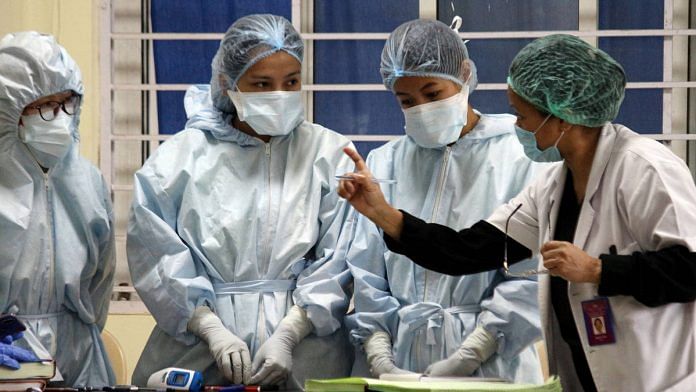New Delhi: The Lok Sabha Wednesday passed the National Commission for Allied and Healthcare Professionals Bill, 2021 that aims to regulate allied healthcare professions such as laboratory technicians, radiographers, etc., who are a critical part of the medical profession.
The Bill provides for setting up of commissions and councils for the regulation of these professions and introduces the concept of maintaining a national register of all allied healthcare professionals.
People who haven’t enrolled themselves under the national register will not be allowed to practice and may face a fine of upto Rs 5,00,000 and imprisonment of upto one year.
ThePrint explains the key points of the Bill and why it’s an important legislation.
Who is covered under the Bill?
The Bill defines an allied healthcare professional as an “associate, technician or technologist who is trained to perform any technical and practical task to support diagnosis and treatment of illness, disease, injury or impairment, and to support implementation of any healthcare treatment and referral plan recommended by a medical, nursing or any other healthcare professional, and who has obtained any qualification of diploma or degree under this Act, the duration of which shall not be less than two thousand hours spread over a period of two years to four years divided into specific semesters.” A healthcare professional is a scientist or therapist who is involved in the curative or therapeutic aspects of medical care.
The allied services broadly include professional categories such as physiotherapy, occupational therapy, ophthalmic sciences, nutrition sciences, medical laboratory and life sciences, medical radiology, imaging and therapeutic technology, medical technologists and physician associates, trauma, burn care and surgical/anesthesia-related technology, community care and behavioral health sciences and health information management and health informatics.
Also read: India’s healthcare workers are the most vulnerable, but there is no framework for their health
Why is it necessary
There are regulatory structures in place for doctors, nurses, pharmacists and dentists and the healthcare system has diversified in recent years, but the allied professions have remained neglected.
The 117th report of the department-related Parliamentary Standing Committee of Health and Family Welfare that examined the Bill said utilisation of skills possessed by allied and healthcare workers is key to health sector reforms in India.
“However, with the advancement in science and technology, these healthcare professionals have now become the part and parcel of modern medical establishment whose quality and competency often play a major role in making the system sensitive and efficient. Perceived appreciation and optimal utilization of the whole range of skills possessed by allied and healthcare professionals is the key to health-sector reforms in India, especially given the shortage of doctors and nurses in semi-urban and rural areas of the country.”
Major provisions of the Bill
The Bill lays down the groundwork for regulating professional conduct, code of ethics and etiquette to be observed by allied and healthcare professionals. It also provides for a uniform entry examination with common counselling for admission into allied and healthcare institutions at diploma, undergraduate, postgraduate and doctoral levels and a uniform exit or licensing examination.
Once the Bill becomes a law, there will be a Central Council for these professions and corresponding State Allied and Healthcare Councils. The Bill also restricts such professionals from misrepresentation and even misuse of titles and ensures penalties for such offences.
Also read: 162 doctors, 107 nurses, 44 ASHA workers died due to Covid in India till 22 January — Govt
Past efforts
This is not the first time that the government has tried to regulate these professions. In 2011, the UPA government brought the National Commission for Human Resources for Health Bill that was rejected by the standing committee. A Paramedical and Physiotherapy Central Councils Bill 2007 was introduced in the Lok Sabha and underwent some legislative scrutiny before it lapsed after the tenure of the 14th Lok Sabha came to an end in 2009.
Penal provisions under the Bill
The Bill defines various offences such as misuse of title, failure to register or failure to surrender the certificate of registration and lays down penalties for each of them.
“Whoever contravenes any of the provisions of this Act or any rules or regulations made thereunder shall be punished with imprisonment which shall not be less than one year but which may extend to three years or with fine which shall not be less than one lakh rupees but which may extend to five lakh rupees or with both,” the Bill lays down.
(Edited by Neha Mahajan)
Also read: How states/UTs are getting ready to roll out Covid vaccine drive for the 45+ from 1 April



